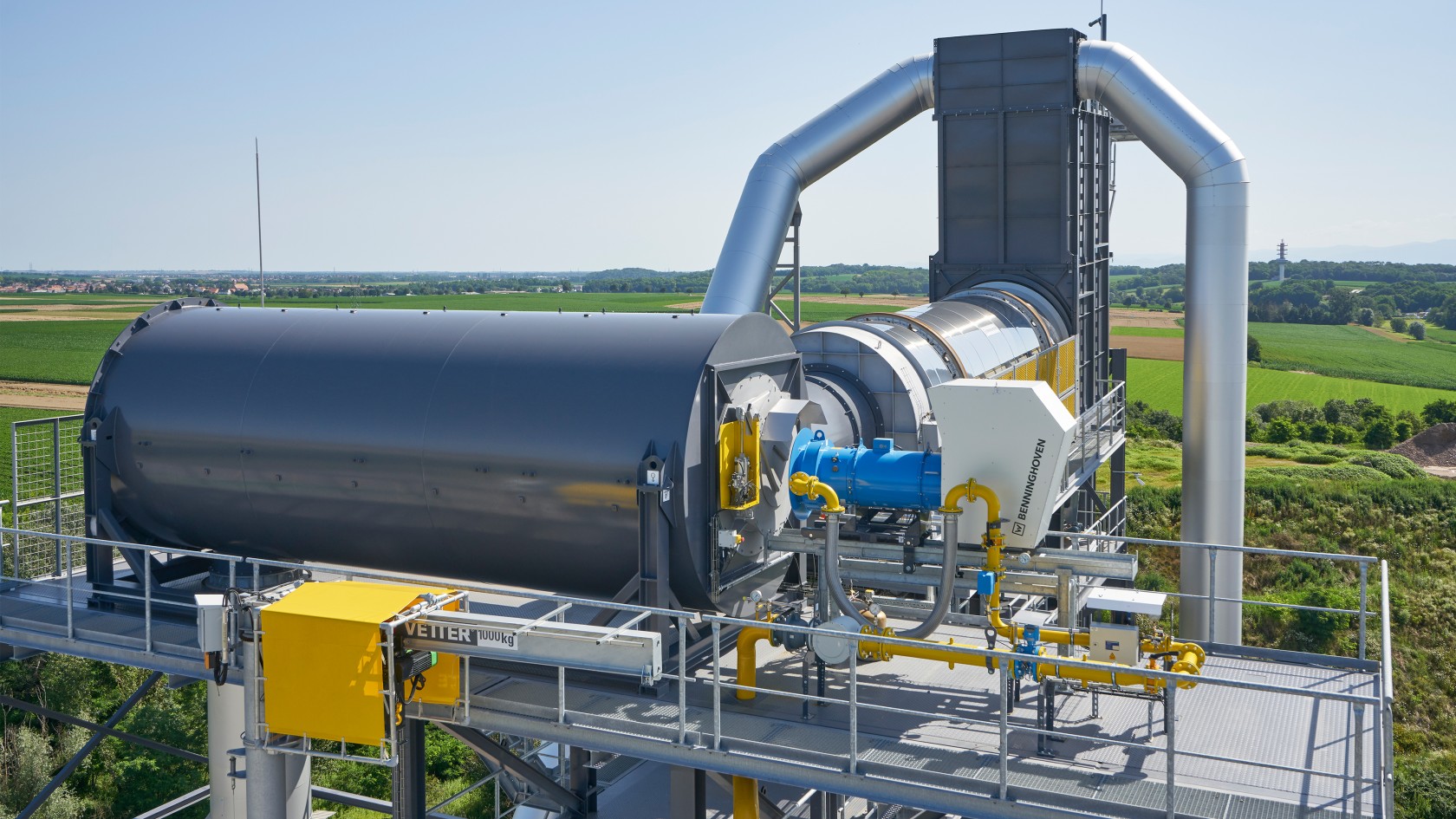Benninghoven | Hot-gas generator


Benninghoven’s leading recycling technology drives high contribution rates for recycled materials while cutting emissions in asphalt production
With the Benninghoven hot-gas generator, operators can produce asphalt from 100 percent recycled material while ensuring compliance with new, tougher emissions standards like the German TA-Luft.
Resource-friendly asphalt recycling reduces CO₂ footprint
The hot-gas generator is a technological system for maximizing rates of recycled material during asphalt production while keeping emissions to a minimum. As a result, plant operators can make asphalt mixtures from 100 percent reclaimed asphalt. At the same time, operators can stay compliant with tough clean-air regulations – such as the TA-Luft standards in Germany. TA-Luft prescribes significant reductions in emissions: as a result, total carbon (TC) emissions must not exceed the limit value of <50 mg/m3.
With its hot-gas generator, Benninghoven meets requirements for higher contribution rates for reclaimed asphalt plus lower emissions during continuous operation, and with appropriate monitoring. In this way, asphalt recycling with the Benninghoven hot-gas generator makes a significant contribution to reducing the CO₂ footprint. Even the use of 60 percent reclaimed asphalt when producing new asphalt mixture can cut CO₂ by 18 percent over the total road construction process chain.
With Benninghoven’s hot-gas generator, asphalt mixture can be made from up to 100 percent reclaimed asphalt. Full compliance is also assured with newer regulations for lower levels of emissions.
Hot-gas generator: highly sustainable and cost-effective
Operators that use reclaimed asphalt to produce fresh asphalt mixture not only run a sustainable business but can also cut costs, thanks to the hot-gas generator. This is because the costs for reclaimed material are much lower than for virgin mineral from the quarry. The bitumen already contained in RAP is a key part of these cost savings: prices for this expensive ingredient in asphalt production have risen sharply in recent years while also experiencing considerable fluctuations. Since more roads are now being repaired than built, the reuse of reclaimed asphalt is an important point of focus in many parts of the world.
By achieving the maximum possible recycling rate of 100 percent, the hot-gas generator also makes businesses viable for the future.
Hot-gas generator sets the benchmark to beat for recycling
High recycling rates with low emissions can only be achieved by means of the countercurrent flow in the hot-gas generator. This creates only small volumes of TC, since the recycled material is heated to just 160 °C or 320 °F. In contrast to recycled material, pollutants may evaporate out of natural rock asphalts at temperatures under 160 °C or 320 °F. However, the hot-gas generator can reduce these pollutants and therefore prevent them from becoming a problem in the first place.
Applying the countercurrent principle, the burner fires in the hot-gas generator, powerfully heating the ambient air in the recycling drum. This hot air then acts as a gentle and indirect source of heat for the recycled material in the downstream recycling drum, efficiently heating the recycled material to its final temperature. Stephen Mac Nelly, Head of Design & Development at Benninghoven, explains the working principle: “We only feed hot gas to the material in the recycling drum, because the reclaimed asphalt already contains bitumen that would char if we used a direct burner method instead.”
Indirect – and gentle – heating: unlike virgin mineral in the dryer drum, recycled material is heated indirectly by hot gas.
Benninghoven hot-gas generator also available as a retrofit
For new asphalt mixing plants, Benninghoven offers its RPP series of plants, which are designed from the outset for processing high volumes of recycled material and have an integrated hot-gas generator. RPP stands for Recycling Priority Plant – i.e. plants that prioritize RAP in their material flows. “As a result, our RPP-type plants are built to maximize RAP inputs and meet some truly demanding requirements,” says Mac Nelly.
Operators of existing plants can make use of this ultramodern technology by retrofitting a hot-gas generator. This leading asphalt recycling technology also helps to ensure that plants can keep their operating permits as regulations are tightened: Mac Nelly: “We can also install the hot-gas generator as part of a retrofit project, for businesses looking to modernize and achieve higher rates of reclaimed asphalt input.”
The hot-gas generator from Benninghoven: a video explainer by Steven Mac Nelly, Head of Design & Development:
Benninghoven: Interview with Steven Mac Nelly - The Future of Asphalt Production
Public Relations
Reinhard-Wirtgen-Straße 2
53578 Windhagen
Germany



